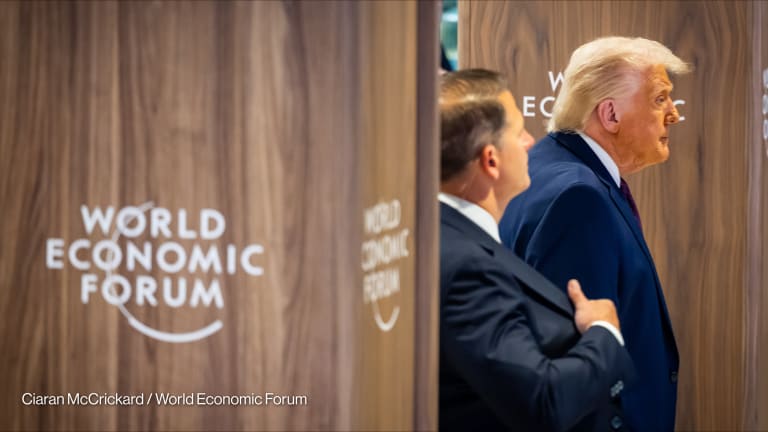
DAVOS, Switzerland — It can be easy to get caught up in the myriad of issues and debates, in the whirlwind of formal speeches, side events, and cocktail receptions that dazzle the Swiss town of Davos every January. The real test of the World Economic Forum’s worth for the global development community will come later, in the form of follow-up action.
In the meantime, in a fast-moving set of conversations tackling the world’s geopolitical and business challenges, the development issues can get lost. Here’s what made a splash this year and what didn’t fare as well.
Women’s empowerment and gender equality
An all female panel of co-chairs made sure to raise issues of women’s economic development and involvement throughout the highest levels of business — from supporting small women entrepreneurs in India, to changing cultures to see more women in the C-suite.
Read Devex coverage of the World Economic Forum Annual Meeting in Davos:
▶ What does Davos mean for global development?
▶ Mark Green at Davos to 'tap into the creativity' of the private sector
▶ Gates and IDB announce plan to eliminate malaria in Central America
▶ In Davos, the art of the development deal
► Impossible Foods: On the menu in Davos, on a mission to scale globally
► Tony Blair says improving governance is key to development
Canadian Prime Minister Justin Trudeau spoke passionately about women’s empowerment, and the corresponding need for girls’ education, on a panel alongside Malala Yousafzai. He also committed $180 million to the Global Partnership for Education, which some hope will generate momentum for the fund’s fundraising summit later this week.
Jamie Drummond, co-founder and executive director of the ONE Campaign, said he had a good meeting with the Canadian delegation about women’s economic empowerment. With proper follow-up, it could lead to greater commitments from the Canadians. Trudeau has a unique opportunity to elevate these issues when Canada hosts the G-7 Summit, but it remains to be seen what actions will follow his rhetoric, Drummond said.
The conversations about diversity and inclusion was more ingrained this year, but there could have been more space on the agenda for those issues, and the Sustainable Development Goals deserve greater permanence in the discussions, Plan International CEO Anne-Birgitte Albrectsen told Devex.
“Did they get the attention that they need to? No. Did they get more attention than last year? Yes,” she said.
A lot of the conversation at Davos was about multinational companies, so beyond how more women can take leadership positions among their ranks, Albrectsen said the conversation needs to be about how corporations can play a role in changing the narrative about where women belong, as well as working on equal pay.
“If they don’t do their part to change societies, they don’t get a diverse workforce,” she said. “Even in middle-income countries where there is gender parity in secondary and tertiary education, there is not equal participation. The missing link is addressing gender norms.”
In general, the rising movement around sexual harassment and assault is “phenomenal, exciting and catalytic,” she said, but there are questions about how much it has reverberated around the world.
With sexual harassment and abuse as the single biggest concern for almost every girl in every developing country, the issue has to make the leap from the United States or European headlines, and will require a great deal of work to change norms.
The ONE Campaign has launched the Poverty is Sexist campaign “to link the global conversation and anger in the North and globalize that equality campaign,” Drummond said.
While she would have liked to see it happen this year, Albrectsen hopes that 2019 sees all CEOs in attendance at the World Economic Forum publicly declare that for them there is a zero tolerance for sexual assault, and that they will create accountability.
Global health
From pandemic preparedness to malaria eradication and antimicrobial resistance, there were some valuable conversations and announcements about key global health issues.
As Devex reported, the Bill & Melinda Gates Foundation used the occasion to commit $180 million to malaria eradication in Central America. There were also quite a few discussions on global health security and pandemic preparedness.
John Hewko, general secretary of Rotary International, spoke about what is needed to take polio eradication across the finish line, and how the polio early warning systems set up in many countries can be adapted to monitor other diseases, and not be a resource lost as the polio fight is won.
#WEF2018 @nealkg, CEO of @mercycorps, on determined realists and why the world doesn't need sunny optimists right now @Davos @catherinecheney @wef pic.twitter.com/0wxFoWE0en
— Devex (@devex) January 29, 2018
Youth
Despite a growing youth bulge in Africa, this year Davos fell short in addressing the needs of children and youth, according to several development professionals.
“Children were nowhere to be seen,” said Andres Franco, director of private sector engagement at UNICEF. Still, Davos provides a platform for useful high-level meetings about the agency’s agenda for children, and helps those in Davos understand what is happening on the ground in countries around the world.
Opinion: Dear Davos Man: 3 things to do and die happy
ONE Campaign co-founder Jamie Drummond will turn his back on Davos unless real progress is made during the World Economic Forum Annual Meeting this year.
Drummond went into Davos looking for the forum to accomplish or move the needle on three key objectives, including whether there would be significant funding for the African youth boom and talks around how to create jobs. That didn’t happen, he said, possibly because Africa is not well represented in Davos.
Still, Drummond met with the head of the WEF Africa team to talk about the potential for the continent to drive growth as well as the dangers of not making investments including poverty, corruption and further destabilization. As countries on the continent struggle to grow, new debt crises also threaten, which could further slow economic growth.
A changing private sector
Many of the world’s largest development institutions and international NGOs head to Davos to seek out and build relationships with potential private sector partners, and several of them told Devex that they’re starting to sense a changing attitude among the world’s largest companies.
There was a greater sense of awareness in the private sector this year than in years past about their important role in achieving the SDGs, Hewko said.
Companies also seemed more willing than before to take on big societal issues in their advocacy and policy agenda, Albrectsen said. Plan has been working with corporations for years, and those relationships have evolved, but now more businesses are asking how they can work together on research campaigns to amplify gender inclusion and work to change societies, she said.
Still, companies tend to be along a spectrum of their engagement on issues of the Sustainable Development Goals, Franco said. Some are still focused on corporate social responsibility and philanthropy, but others are more sophisticated in the way they are addressing some of the challenges the SDGs pose, he said.
Development financing
The conversation at Davos reflected a broader focus on blended finance and innovative financing instruments to finance the SDGs and respond to humanitarian crises.
At the same time, some of the bankers, who are starting to feel the pressure from clients who want to make sustainable investments that align with their values, are talking about how to provide a new generation of sustainable investing products.
The Blended Finance Task Force for the Global Goals used Davos as the moment to release a new paper examining the roughly $50 billion blended finance market, the opportunities for growth, and the barriers that prevent further mobilization of private capital for the SDGs.
There were also discussions about how to take forward some of the commitments at the World Humanitarian Summit with regards to finance, the need to spend more on preparedness, and about the role humanitarian impact bonds might play.
Development impact bonds and other innovative financing mechanisms were also on the agenda, with the U.S. Agency for International Development along with a group of partners presenting about the maternal and child health development impact bond they announced late last year.
The key to many of these financing mechanisms, and to increased investment from some of the world’s largest investors, will depend on reliable measurement systems that can prove a project or company is a worthy investment.
The SDGs and action
While there were discussions outside the main conference center, there was only one session explicitly focused on the SDGs in the formal program. And while several development leaders present in Davos said they would have preferred more of a focus, they also understood why the SDGs weren’t front and center.
“I think the WEF makes a strong effort to get the development issues, sustainability issues on the agenda,” said Kevin Jenkins, president and CEO of World Vision International, adding that it wasn’t as much as he would like, but that he doesn’t expect it to be the primary topic.
“One of the challenges is always converting attention into progress, into action,” he said.
As a global village, the world tends to underreact to problems; 800 million people going to sleep hungry doesn’t elicit the same sharing response as a neighbor going hungry, he said. While Davos is a useful platform, it also seems it’s likely to only move the needle marginally.
Jenkins said he is more encouraged by the corporate partnerships, but that they are often interested in pilots but rarely stick through things as they scale, which would have greater impact. Still, Davos is a good place to get senior people committed to working on key issues, he said.
Davos is also a place where the discussions not on the formal agenda may be the most productive, said Mercy Corps CEO Neal Keny-Guyer, who told Devex he had productive conversations about the reform of the humanitarian system, inequality, and the social determinants of health.
“I think we’re entering a real period of fragility,” he said. “It is a fractured world and we need to come together for shared solution. I still think there’s a tendency in these gatherings to cheerlead, to be a little Pollyannaish, and what we need today are determined realists who understand the value of coming together to build a better world.”
Catherine Cheney contributed reporting to this article.
Search for articles
Most Read
- 1
- 2
- 3
- 4
- 5








